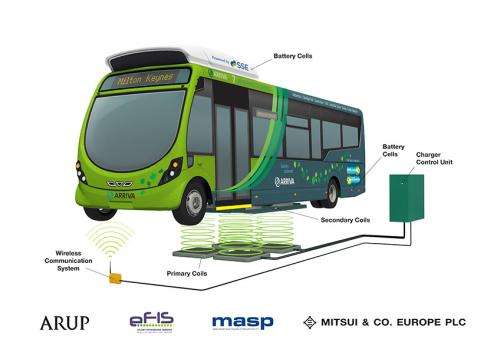January 11, 2014 weblog
Electric buses with wireless charging set for UK runs in Milton Keynes

(Phys.org) —The UK can celebrate the launch of its first electric bus routes, to swing into operation this month in Milton Keynes, where eight electric buses will be running, taking over a busy "Number 7" 15-mile route, and covering two suburbs of Wolverton and Bletchley. These buses are the first of their kind in the UK. The new timetable will be implemented later this month. The electric bus fleet is operating as a five-year, multi-partner trial program. Among the participants are the European division of Japanese company Mitsui and design engineering consultancy Arup According to Arup, the data collected in the Milton Keynes trial could be used to kick-start electric bus projects in other towns and cities worldwide
The launch this month is a test to see if these electric buses, which are to run a continuous, 17-hour service, can match their diesel counterparts in performance under busy real-world conditions. The program is to be closely monitored in order that the program's participants can assess if these buses' technical and commercial viability meet expectations.
"If we can demonstrate true parity with diesel buses during this trial, we'll have reached a tipping point for low-carbon transport – we'll have proved it can be cost-effective as well as green," said Professor John Miles of Cambridge University, department of engineering and Arup consultant.
The technology at play involves wireless charging where the bus batteries get their charge from underground induction coils positioned at the start and end of a bus driver's route. Charging plates are set into the road, for transferring power to the receiving plates under the bus.
A report in IEEE Spectrum further explains what takes place: "Inductive charging occurs when an electric current run through a coil, creates a magnetic field, which, in turn, induces current in any nearby conducting loops. When a bus stops at either of the charging stations, its on-board induction loops, lowered to four centimeters above ground, enter the magnetic field. The resulting current tops up its batteries enough to ensure it has enough energy to make it to the other end of the route and its next charge up."
After a night charging at a depot, where the bus will get a full charge from its source, a bus will be able to replenish its batteries during its daily runs throughout the day with a ten-minute charge from the plates which are buried in the road. Two charging points can service all eight buses, which will charge in the time scheduled for driver breaks.
The inductive charging approach has the advantage of allowing the buses to run with smaller lighter batteries, with less dependence on onboard energy storage.
© 2014 Phys.org















